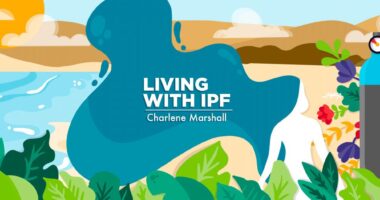Held back by breath: The reality of living with pulmonary fibrosis
The unseen, day-to-day struggles most of us with my disease face

When your lungs betray you, your voice becomes your strongest tool. That’s what it means to live and speak through pulmonary fibrosis (PF).
Living with PF or another rare disease involves managing various challenges that can affect time, emotional well-being, and physical health. The countless doctor appointments, procedures, and laboratory tests become an unyielding cycle, leaving little room for the semblance of a normal life.
Each scheduled visit is a reminder of the vulnerability of health, and each examination carries the weight of hope and unease. Managing this disease regularly can disrupt daily routines and affect the normal comforts experienced in everyday life.
What many people don’t see is just how much this disease rearranges every aspect of your day. Errands, work, and social plans must be balanced with oxygen levels, energy, weather, and medical appointments. There is no “picking up and going.” Every day must be mapped out with precision and caution.
If I have a doctor appointment at 10 a.m., for instance, the entire day revolves around it. The prep starts the night before: packing my oxygen, charging batteries, organizing medications, checking weather reports for heat or ozone alerts, and calculating whether I’ll have enough energy to do anything else after the appointment.
And the answer is usually no.
Scheduled appointments can be lengthy and stressful, often involving extended waits in less-than-ideal environments. A visit for blood work might seem like a quick errand, but when you add the commute, the wait time, and the recovery from simply leaving the house, the entire day is swallowed.
And then there are the procedures: bronchoscopies, pulmonary function tests, imaging scans, and sleep studies. All of these come with side effects, anxieties, and recovery time. Even when a procedure is supposedly routine, it’s never routine for the person living it.
This disease doesn’t just carve time out of your schedule; it hijacks your entire existence.
The effect on my community
Yet I’m not the only one affected. My caregivers, my husband and my daughter, have had their lives turned upside down alongside mine. The burden of care doesn’t pause when the appointment ends. They coordinate transportation, advocate on my behalf, translate when medical terminology becomes overwhelming, and emotionally hold me up when I’m too tired to stand on my own. They’re the unsung co-patients of this journey.
My family members not only attend appointments, but also adjust their own schedules to accommodate them. Jobs are missed. Sleep is interrupted. Their social lives shrink. Their own needs are often deferred because mine are more urgent. While I’m thankful for their support, I occasionally experience an inexplicable feeling of guilt.
Chronic illness requires both accommodations and support from individuals. It reshapes relationships and forces roles to change. A partner becomes a nurse. A child becomes a medical translator. A friend becomes a chauffeur.
PF has permanently altered the landscape of my life. I used to be able to walk freely, teach full days, and travel without fear. I used to take deep breaths without thinking about them.
Now, every breath feels rationed. I live tethered to machines. I monitor air quality like some people monitor traffic. I carry my health records with me like armor, ready to present them at a moment’s notice. I’ve gone from being independent to being monitored. From impulsive to meticulously planned. From full of plans to full of pills.
Speaking out for us all
Still, in the face of this upheaval, I’ve found a voice I didn’t know I had.
As a sociology professor and writer, I now use my story to advocate for those who can’t speak up, especially in communities that are often overlooked: Latinas, older women, low-income patients, and people who are managing rare diseases without access to resources or support systems.
The invisibility we face is real. It shows up in dismissive doctors, unaffordable medications, limited access to transplant centers, and language barriers that silence entire families.
Sharing these truths isn’t easy. It means making myself vulnerable. But I do it because it might help someone else feel less alone. Because others like me are sitting in waiting rooms, feeling like time is slipping away while the world moves on without them.
Yes, this disease has robbed me of many things. But it’s also given me clarity. I now know what matters most, and it includes connection, dignity, and the ability to advocate for myself and others. I find strength not in pretending I’m OK, but in telling the truth about what it takes for me to simply get through the day.
Living with PF isn’t a temporary setback; it’s a full redefinition of life. It’s about mourning the person you once were while still learning to love the person you’re becoming. It’s about building a new identity based not on what you’ve lost, but on what you’re still capable of giving.
I’m still here. I’m still giving. And I’m still breathing — with help, yes, but with purpose.
Note: Pulmonary Fibrosis News is strictly a news and information website about the disease. It does not provide medical advice, diagnosis, or treatment. This content is not intended to be a substitute for professional medical advice, diagnosis, or treatment. Always seek the advice of your physician or other qualified health provider with any questions you may have regarding a medical condition. Never disregard professional medical advice or delay in seeking it because of something you have read on this website. The opinions expressed in this column are not those of Pulmonary Fibrosis News or its parent company, Bionews, and are intended to spark discussion about issues pertaining to pulmonary fibrosis.








Leave a comment
Fill in the required fields to post. Your email address will not be published.